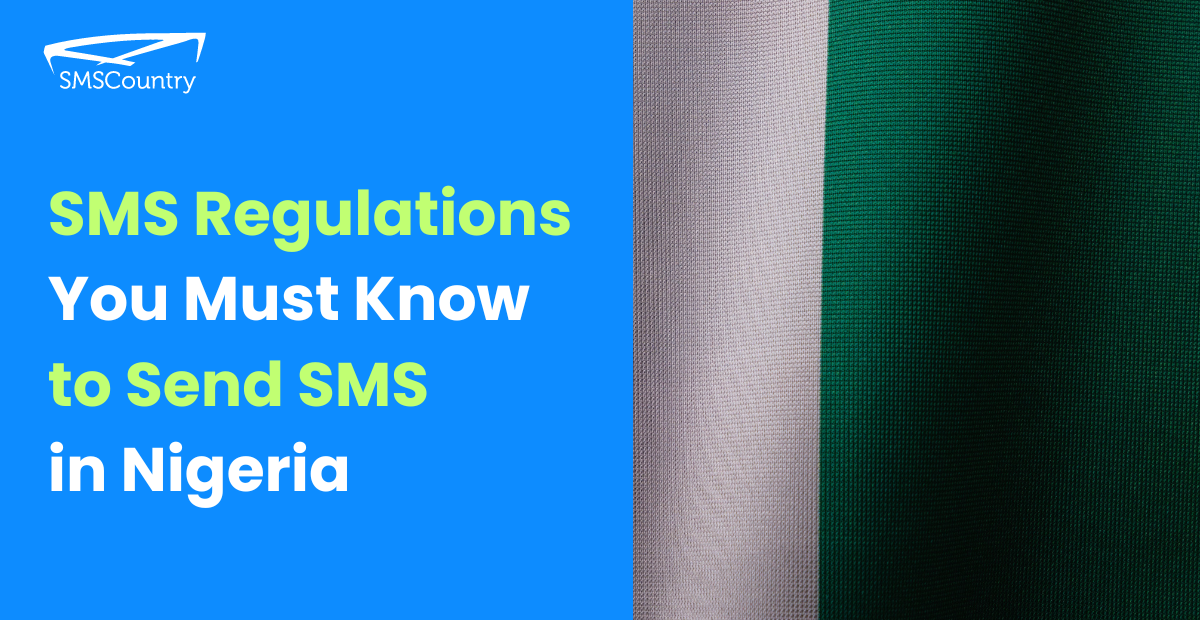Are you planning to send SMS in Nigeria?
If so, knowing the SMS regulations you must comply with is essential. Failure to comply with these regulations can lead to legal issues and damage your business’s reputation.
By the end of this article, you will know the SMS regulations in Nigeria that you need to comply with to be on the right side of the law.
So, let’s get started.
| SMSCountry is the best bulk SMS service provider for OTP, transactional, and promotional SMS in Nigeria. Learn more about our SMS services. Get started or book a demo. |
What are the SMS regulations in Nigeria you should know?
Here are the SMS regulations you must know to send SMS in Nigeria:
- Get express consent
- Include opt-out instructions
- Identify yourself as the sender
- Do not send unsolicited messages
- Do not send messages to DND numbers
The source of these rules is the Nigerian Communications Commission (NCC). Let’s look at each of the rules.
Rule #1 – Get express consent
To send SMS in Nigeria you must obtain express consent from the recipient. This means the recipient must have permitted you to send them SMS messages. You can obtain consent through a sign-up form, a website opt-in, or an SMS message opt-in.
Rule #2 – Include opt-out instructions
Include opt-out instructions in your SMS messages for recipients to unsubscribe. Do this for both promotional and transactional OTPs.
Include opt-out instructions such as “Reply STOP to unsubscribe” in your SMS messages.
Rule #3 – Identify yourself as the sender
To comply with this regulation, include your company or brand name in the SMS message.
Rule #4 – Do not send unsolicited messages
Avoid sending unsolicited messages to recipients without their permission. Obtain express consent from the recipient before sending SMS messages.
Rule #5 – Do not send messages to DND numbers
Avoid sending SMS messages to numbers on the Do-Not-Disturb (DND) list. Check if the number is on the DND list before sending them SMS messages.
What are the major SMS regulatory laws in Nigeria?
Nigeria’s regulatory laws govern the sending of SMSs. Here are the major SMS regulatory laws that regulate SMS and communication in Nigeria:
- Nigerian Communications Act (NCA)
- Wireless Telegraphy Act (WTA)
- National Information Technology Development Agency (NITDA) Data Protection Regulation
- Consumer Protection Council (CPC) Act
- Nigerian Data Protection Regulation (NDPR)
| Check out the best SMS service provider and reliable OTP service provider in Nigeria. |
Nigerian Communications Act (NCA)
The Nigerian Communications Act (NCA) is the primary legislation that regulates the communications sector. The NCA established the Nigerian Communications Commission (NCC). The NCC has the power to regulate SMS messaging in Nigeria.
Wireless Telegraphy Act (WTA)
The Wireless Telegraphy Act (WTA) is another legislation that regulates the communications sector. The WTA oversees licensing and regulation of wireless telegraphy in Nigeria. The NCC is responsible for enforcing the provisions of the WTA.
NITDA Data Protection Regulation
The NITDA Data Protection Regulation is a regulation that governs the processing of personal data in Nigeria. The regulation applies to businesses that process personal data, including SMS messages.
Consumer Protection Council (CPC) Act
The Consumer Protection Council (CPC) Act protects consumers from unfair trade practices. The CPC has the power to regulate SMS messaging in Nigeria.
Nigerian Data Protection Regulation (NDPR)
NDPR is a regulation that governs the processing of personal data in Nigeria. The regulation applies to businesses that process personal data, including SMS messages.
What are the penalties for not complying with SMS regulations in Nigeria?
Penalties for regulatory non-compliance come in multiple forms, including:
- Serious safety breaches may result in significant fines.
- Non-compliance can lead to reputational damage, customer loss, and financial setbacks.
- Failure to comply can result in legal action, including civil lawsuits or criminal charges, with potential financial implications.
- There will be limitations on your activities, additional approval barriers, and possible jail times if you fail to comply with regulations.
For example, in 2015, the NCC fined MTN Nigeria $5.2 billion for failing to disconnect unregistered SIM cards.
What are the rules for sending marketing and transactional SMS messages in Nigeria?
Here’s a quick summary of the SMS regulations in Nigeria.
| Regulation | Description |
| Time | There are no specific time restrictions for sending SMS messages in Nigeria. However, avoid sending SMS messages during late hours or early mornings. |
| Sending to DND | Do NOT send SMS messages to numbers on the Do-Not-Disturb (DND) list. This can result in legal penalties, reputational damage, loss of customers, and financial losses. |
| Sender ID | Identify yourself as the sender of the SMS message. The SMS message must include the company name or brand name. Dynamic Alphanumeric Sender IDs are supported, although sending with Numeric Sender IDs will be attempted on a best-effort basis. |
| Template registration | Register your SMS message templates with the Nigerian Communications Commission (NCC) before sending marketing or transactional messages. |
| Requesting consent | Request consent from the recipient before sending marketing or transactional SMS messages. This means that the recipient must have accepted to receive SMS messages. You can obtain consent through a sign-up form, a website opt-in, or a text message opt-in. |
| SMS opt-in | Provide an opt-in mechanism for recipients to receive marketing or transactional SMS messages. You can provide an opt-in mechanism such as a sign-up form, a website opt-in, or a text message opt-in. |
| SMS opt-out | Provide an opt-out mechanism for recipients to stop receiving marketing or transactional SMS messages. You can provide an opt-out mechanism such as “Reply STOP to unsubscribe” in your SMS messages. |
| Message length | 160 characters. |
| Frequency per hour | One SMS per hour. |
| Keep records of consent | Maintain consent records from recipients for a minimum of four years. |
Use SMSCountry to send SMS in Nigeria
Non-compliance with Nigerian SMS regulations can result in legal penalties, reputational damage, customer loss, and financial losses.
To ensure compliance, you need a reliable SMS service provider like SMSCountry. Our team of experts can help you navigate the regulations and restrictions and provide you with the most effective SMS services for your business.
Check out the best SMS service provider and reliable OTP service provider in Nigeria.
Contact us now if you have inquiries about SMS so our team will attend to you.
Nigeria SMS regulations FAQ
Are there time restrictions for sending SMS messages in Nigeria?
There are no specific time restrictions for sending SMS messages in Nigeria. However, avoid sending SMS messages during late hours or early mornings.
Can I send SMS messages to numbers on the Do-Not-Disturb (DND) list?
No, you must not send SMS messages to numbers that are on the DND list. This can result in legal penalties, reputational damage, loss of customers, and financial losses.
Do I need to register my SMS message templates with the Nigerian Communications Commission (NCC)?
Yes, you must register your SMS message templates with the NCC before sending marketing or transactional SMS messages. This is to ensure that the SMS messages comply with the regulations.
Do I need to request consent from the recipient before sending SMS messages?
Yes, you must request consent from the recipient before sending marketing or transactional SMS messages. This means that the recipient must have agreed to receive SMS messages. You can obtain consent through a sign-up form, a website opt-in, or a text message opt-in.
Do I need to provide an opt-in mechanism for recipients to receive SMS messages?
Yes, you must provide an opt-in mechanism for recipients to receive marketing or transactional SMS messages. You can provide an opt-in mechanism such as a sign-up form, a website opt-in, or a text message opt-in.
Expert Advice: Avoid These 8 SMS Marketing Mistakes at All Costs
Do I need to provide an opt-out mechanism for recipients to stop receiving SMS messages?
Yes, you must provide an opt-out mechanism for recipients to stop receiving marketing or transactional SMS messages. You can provide an opt-out mechanism such as “Reply STOP to unsubscribe” in your SMS messages.
Is there a limit to the length of SMS messages I can send?
160 characters.
Is there a limit to the frequency of SMS messages I can send?
Yes. One SMS per hour.
Can I send outbound SMS messages from a local phone number?
Yes, if the directional SMS is “Local”, the messages will be sent to a local phone number.
Can I use an alphanumeric ID for all countries?
Yes, your alphanumeric ID is automatically used in all countries it supports.
Do I need to pre-register for an alphanumeric ID in some countries?
Yes, some countries require pre-registration before using an alphanumeric ID. Check with your SMS service provider for more information.
Can recipients reply directly to messages sent with an alphanumeric ID?
No, recipients cannot reply directly to messages sent with an alphanumeric ID. However, you can provide contact information in your message if you want recipients to message you.
How can I request an alphanumeric ID?
Check with your SMS service provider for instructions on requesting an alphanumeric ID. SMSCountry can help you with this.
Can I send SMS messages to international numbers?
Yes, you can send SMS messages to international numbers. However, you may need to comply with additional regulations and restrictions in the recipient’s country.
Can I send SMS messages to landline numbers?
No, you cannot send SMS messages to landline numbers.
Can I send SMS messages to toll-free numbers?
It depends on the specific toll-free number. Some toll-free numbers may not support SMS messages.
Can I send SMS messages to short codes?
Yes, you can send SMS messages to shortcodes. However, you may need to comply with additional regulations and restrictions in the recipient’s country.
Disclaimer: The information contained in this article is intended to provide a basic understanding of SMS regulations in Nigeria and is not exhaustive. While we have taken reasonable steps to ensure the accuracy and timeliness of the information, we make no warranties or representations of any kind, expressed or implied. Users are solely responsible for conducting further research on the applicable laws, regulations, and codes of conduct governing SMS communication in Nigeria and ensuring compliance accordingly.





